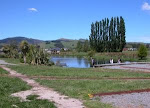by Adele Geradts
Recently I was asked about the removal
of the silver birch (Betula pendula) trees on Rempstone Drive in Halswell.
In 2017, residents of Rempstone Drive asked the Community Board for the Silver
Birch trees in their street to be removed. The Silver Birch trees are not only
a nuisance but also affecting people’s health. You can see the submissions here
Unfortunately, in 2017 there was no
budget for the removal and replanting of healthy trees, so if removal were
approved by the Community Board, this work would need to be programmed.
Residents who presented at the Community Board meeting indicated support to
help fund the replacement of these trees. However, the residents were not
unanimous. The decision was made in 2017 not to remove them, and the residents
still have to deal with the trees getting bigger and creating more pollen as
they grow.
The Silver Birch produces pollen
abundantly and is the leading tree pollen causing allergic symptoms in New
Zealand. Allergic symptoms, include hay fever, asthma and some food allergies.
It is a very potent allergen.
Silver Birches are
planted all over Christchurch and New Zealand. The primary tree pollen allergen season in New Zealand starts in August and runs through October. A significant amount of pollen in the air
occurs between 6.00 am and noon.
Pollen can blow long distances on
windy days, but most pollen stays close to its source. For some hayfever sufferers who are allergic
to trees, grass and weed pollens, allergy season can last from August to March.
The highest pollen counts occur on calm, hot, sunny days from October through
to December.
Avoiding pollen is difficult in
Christchurch, but the following tips from the allergy clinic may help:
- Get advice from your Chemist or family doctor about medications and treatments that will relieve your symptoms. Most medications work best if taken before the symptoms get bad.
- Make use of pollen counts found on the Metservice website. https://www.metservice.com/towns-cities/locations/christchurch
- Stay indoors until after midday (if possible) limiting your exposure. Minimise going out on windy days.
- Wear sunglasses, ideally with side shields, to protect your eyes from the sun and pollen.
- Avoid mowing grass even when the grass is not in flower. Stay inside when the grass is being mown. I you have to mow grass, it helps to wear a mask and eyewear.
- Keep windows closed both at home and when in your car. A car with air conditioning will reduce the pollen load considerably. Consider fitting a filter over the air intake or install a car ionizer or air filter.
- Do not picnic in parks or the country during the high pollen season.
- If you are sensitive to particular weeds or trees that are outside your bedroom window, have them removed when possible.
- Always have your allergies confirmed, so you know what's causing the problem.
- Shower (making sure you wash the pollen grains from your hair regularly); Bathe your eyes frequently and carry a supply of tissues.
For more information check out:



No comments:
Post a Comment